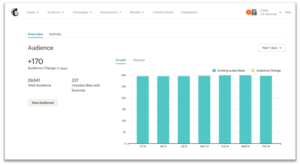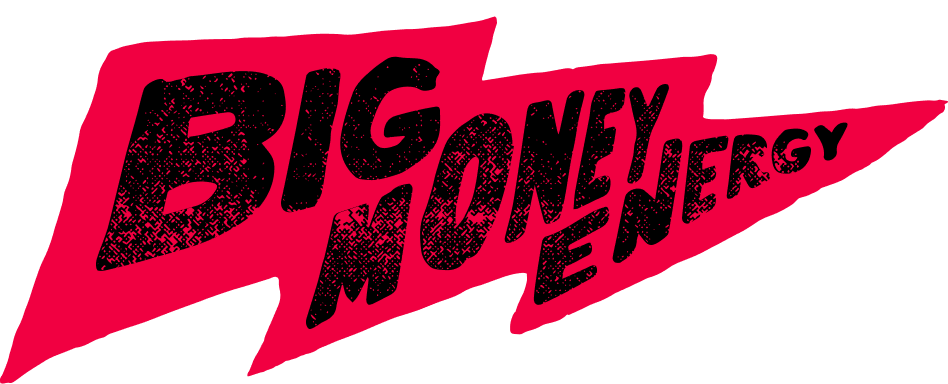
Can you believe that 50% of catering businesses make $1 million or more each year?
You can slice and dice your way into this field by starting a catering business with some cooking skills and business savvy.
Restaurants and catering companies both struggled through the pandemic. But that’s not the end of the story for caterers.
Almost all of them bounced back. In fact, 92% made more money in 2022 than 2021.
And catering companies avoid most of the pitfalls of restaurants.
They require less upfront cash than a restaurant while allowing you to set your own hours and dishes. And they don’t come with as many problems with overhead or spoilage.
@realcodiesanchez Here are the 3 worst businesses you could ever buy… Because I want your work to mean something. Restaurants: The average small business in the US sells for around $800,000; the average restaurant goes for only $198,000. Hotels: These things are expensive, massive wear and tear, asset heavy, and often include … restaurants. Ya’ll know how I feel about that. Retail Storefronts: A business that is only awesome at one thing, burning money. High rent, decreasing user base, you buy a season ahead of time and sell later. No thanks. We the builders. We do the work that everyone needs but no one appreciates. – Codie #financialfreedom #smallbusiness #boringbusiness #investmentstrategy #business #billionairemindset #startupbusiness #bizownershelpingbizowners ♬ original sound – Codie Sanchez
Catering businesses meet a major need in the market.
If you love cooking or party planning, this is the business for you. Follow our steps to learn how to start a catering service and why buying one from someone else is a better choice.
Why You Should Buy an Established Catering Business
Starting a catering company from scratch? It’s hard, no matter how you slice it.
With no reputation, you face an uphill battle getting people to hire you on your first gigs. Most of your first few customers will expect a discount rate, too.
To make it even more difficult? With that discount in mind, you still have to nail your pricing if you want to make a profit on every gig.
Oh, and you have to buy just enough supplies every time. You need to fill each order while not going over with spoilage.
The bottom line? The math alone is hard.
But if you buy an established catering company instead, you get to build on:
- Clear pricing structures
- Prior menu setups and order lists
- The brand’s reputation in the market
- A team of people who already know what they’re doing before and at each job
Running a business in the food space is a challenge for many. And it’s why so many restaurants fail. But you cut your risks big time when you buy into a solid brand and proven model in a catering company.
You can find successful caterers who are ready to hand over the reins on online marketplaces like:
And there are a ton of off-market deals you can find by networking. You can also check out BizScout, a tool that we built to help entrepreneurs find their next business.
But if you still want to start a catering company from scratch, you can follow the steps below to see how.
1. Conduct Comprehensive Market Research
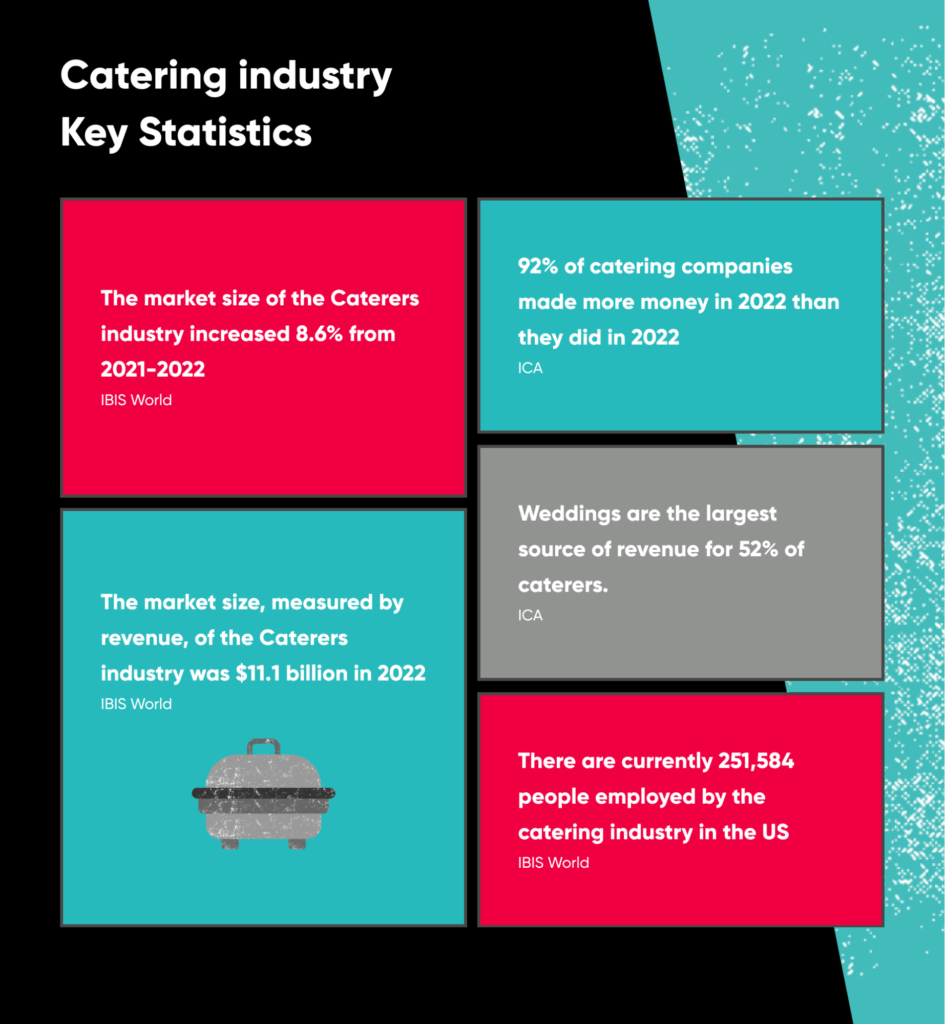
Make sure you know the needs in your region before working to set up a catering company. Thorough market research tells you how many people may want to hire catering companies.
While most people associate caterers with weddings, that’s not your only possible niche. Other options include:
- Corporate events
- Special home events (holiday celebrations, dinner parties, etc.)
- Baby showers
- Bridal showers
- Galas
Look at the caterers in your area. Find the answers to these questions:
- Are there any open niches that they don’t serve?
- How easy is it to reach them for a quote?
- How far out are they booked?
Read your competitor’s customer reviews. What does it seem like they do well? What are the most common complaints?
You’ll be able to make better decisions about what type of catering you can offer when you understand the lay of the land. You might learn that there are entire niches that are wide open and waiting for you to serve them.
There’s an advantage to buying an existing business when it comes to market research. You won’t need to do as much.
An ideal business to buy has done the lion’s share of the market research for you. They know who their customers are, and they know what they want. You just need to come in and start listening to customer feedback to improve the business.
2. Develop a Business Plan
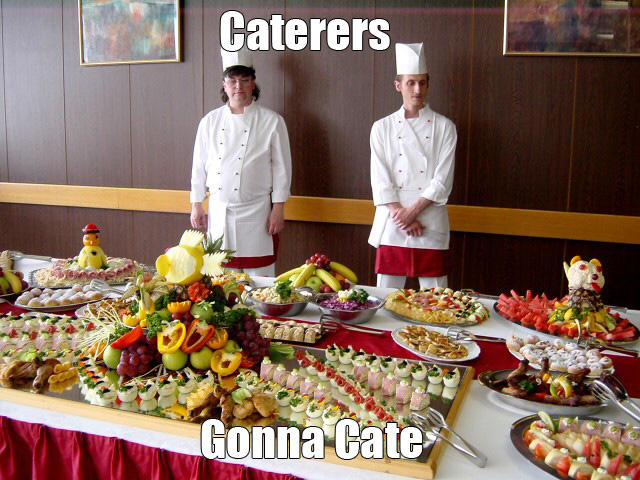
Use the results of your market research to create a well-structured business plan.
Your plan lays the groundwork for a successful launch of a new catering company. It’s also important if you need to get outside funding from a bank or investors.
Inside your business plan, you should:
- Explain your target market and why it’s the right choice for you and your market
- Identify your unique selling proposition (USP)
- Explain your business structure, such as sole proprietorship, LLC, or corporation
- Outline your startup costs, operational costs, and projected earnings
- Outline your pricing structure
- Detail your marketing plan
Sole proprietorships are the simplest business structure, but they come with a drawback.
Your personal and business assets aren’t separated in this arrangement. If something goes wrong and someone sues you, your personal finances are at risk.
Limited liability companies offer some protection. And they don’t take much to register with your secretary of state.
A corporation comes with special rules and additional paperwork. That makes sense if you’re doing a ton of business and need the liability protection and tax savings offered by a corporate structure.
Think over what makes the most sense for your business needs and file registration.
Note: Since you’ll be doing business locally, verify what business licenses your county or city requires for an in-home or onsite catering company.
Pricing your menus is critical for building any profitable catering company, so choose a pricing structure now.
Start with a per-head price for food and then factor in other things like:
- Supplies
- Wait staff pay
- Bar costs.
For food costs only, prices per head vary based on the type of cuisine ordered. For example:
- Buffet dinners: $10-14
- Hors d’oeuvres: $14-18
- Plated dinners: $11-15
- Stations meals: $14-18
Craft a Memorable Menu
Creating a menu is a special part of the business planning process for catering companies.
You can’t get anywhere in the catering world without making really delicious and memorable food. From fancy charcuterie boards to cooked-to-order meat, you can succeed with any type of menu.
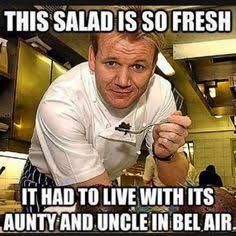
Try to match your cooking style with client preferences, all while being mindful of dietary restrictions.
You might detail your menu within your business plan or keep it in a separate document.
A lot of deep thinking goes into crafting a complete business plan. But you can bypass a lot of it by buying an established catering company.
A company that’s been around for a while will have a good handle on its market. The previous owner will have a well-defined menu and pricing structure. They also have a foot in the door with existing customers.
You can slot right in and modify the plan as needed rather than starting with a blank canvas.
3. Know Your Legal and Regulatory Requirements
One of the most complicated parts of opening a catering company is applying for permits and licenses.
But the last thing you want is for your local health department to shut your business down and kill your reputation.
If you cook from home, you need to read through all of your state or local requirements for catering businesses, too. You might need to update any at-home kitchen areas.
Some states, for example, require things like:
- Better ventilation
- Three-section sinks
- Non-permeable food prep surfaces, like stainless steel countertops
In other states, you can prep at home but might need a commercial kitchen to cook the food before delivering it to clients.
You also need to consider:
- A resale license, which adds sales tax to items you purchase and then sell to clients, such as napkins.
- A general business license with your county and a home-based business license, if applicable.
- A food handler’s license, which some cities or counties require.
- A food service license (also called a catering permit or food operating permit).
- A liquor license, if you’ll serve alcohol
You can get a head start on all of the legal requirements by buying a catering business. An ideal catering company to buy is one where you will not have to worry about getting all the right paperwork.
Instead, you can verify that the company follows all the rules and get right to cooking.
4. Finance Your New Venture
Once you know what you want to offer and what it will cost you to launch this new company, get your finances in order.
Here are the main options to fund it:
- Personal savings, private loans, or credit cards
- Business loans, like bank or SBA loans
- Investors or crowdfunding
You may not want to tie up all your personal funds into the business if you have them.
With bank and business loans, your start date may get delayed with the metric ton of paperwork these may require.
And if you score funds from investors, they may expect a payback in future profits forever.
But if you can find an existing business to buy instead, a 4th option opens up.
You can use seller financing to get better terms than a bank loan and start with everything you need. In a seller-financed deal, you propose terms for down payments and payback periods to the original owner.
5. Choose the Perfect Location for Your Kitchen
You need a home base for your catering company.
Some people choose to start out of their own kitchen if local laws allow it. At some point, these people also discover that they want a one-stop shop for all their storage, prep, and cooking needs.
Whether you rent or buy your location, look for somewhere with a commercial kitchen.
Building a brand-new, restaurant-grade kitchen can cost anywhere from $15,000 to $100,000. Unless you have a ton of startup cash, it’s easier to find a place that has the appliances you need.
Buying a business shortcuts this step, too.
If you find another caterer who’s ready and willing to sell, you can negotiate their facility into the deal. You can start operating from there on day 1 rather than spending valuable time outfitting a new kitchen.
6. Procure Equipment and Supplies
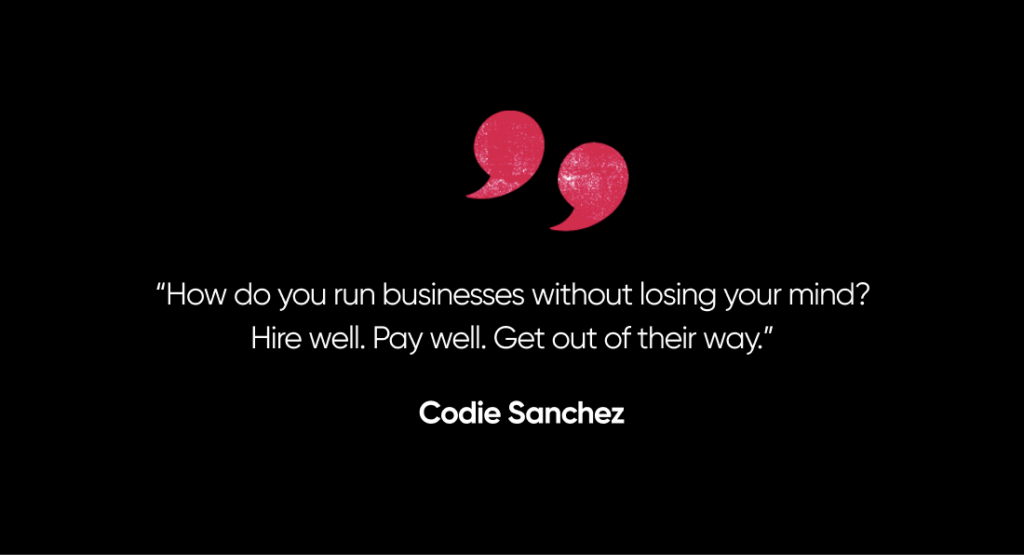
Catering companies are more than just food and a kitchen. There’s a whole range of other supplies you will need.
In general, you’ll want:
- Table settings
- Stand mixers
- Induction cookers, burners, or outdoor grills (or all 3!)
- Bread baskets
- Decor/display items (cake stands, vases, table numbers, etc.)
- Transport supplies (outdoor coolers, food pan carriers, racks)
- Serving equipment (aprons, food pans, serving trays)
- Beverage supplies
- Furniture (optional, but depends on what kinds of events you cater)
- Cleaning supplies
- A company vehicle
You need a way to manage inventory, too, so that you’re never caught without spoons.
Look into tools like BetterCater or Caterease to manage your inventory, schedule, and proposal process. These tools also help make it easy for customers to place orders with you online.
Buying an operational catering company cuts out the hard work of getting all the supplies.
One of the major benefits of buying a business is that all their stuff transfers to you in the deal. You’ll start off on the right foot with the tools you need.
6. Hire and Train Staff
Do not try to run a catering company all on your own. I repeat: do not do it.
With a team behind you? Catering can flow beautifully.
But on your own? Guaranteed stress-fest.
Some required roles you need to fill:
- Chefs
- Servers
- Event planners/customer service
- Clean-up/load crew (if not your servers)
Train all your staff on best practices for food safety and interacting with guests.
Dealing with scheduling, wages, and benefits is more of that tricky math. It’s so hard to figure out when you launch a new business, but you can’t start up without it.
You’ll start out with a crew that knows what it’s doing if you buy a business. Instead of scrambling to hire and train, you’ll start out with a well-oiled machine. You might even try to get the previous owner to stay on for a while or promote an employee to act as a day-to-day operator.
7. Streamline Operations
You need strong operations skills and tools to manage multiple upcoming events at once and the different staff needed for each one.
A few things you can do to make life easier for yourself:
- Establish efficient workflows for taking orders, buying materials, and prepping food
- Implement quality control measures and checklists to ensure consistency
- Use booking and event management tools like HoneyCart, Toast Catering, or BetterCater
If you buy from a caterer who’s been in business for a while, you can scale what’s working for them and look for areas to optimize, too.
8. Promote Your Catering Business
You can’t make any money in catering if potential clients don’t know about you.
You need marketing to let potential clients know:
- Who you help
- What type and size of events you can handle
- What kinds of food you offer
Both offline and online marketing methods can put you in front of your ideal customers.
To attract your first few customers, offer promotions and discounts. Rely heavily on these early reviews and testimonials to get more orders.
Network within the industry by forming partnerships with event planners and other experts.
Online, build a website with photos of your food spreads and details about how to book you. Claim social media profiles and a Google Business presence, too (great for reviews!)
If you buy a catering business with an earned reputation for great food and customer service, you can use that to book gigs from the jump. You’ll benefit from the business’s existing customer relationships while you use marketing to forge new ones.
Plan for Growth and Expansion
With glowing reviews and smooth-like-butter operation, you can turn your attention to scaling.
A few things to think about:
- Always collect customer feedback to find ways to improve (you might discover a slam dunk offer you overlooked)
- Stay up to date with industry trends
- Offer ongoing training for staff
- Diversify with new opportunities like festivals, food trucks, or pop-up events
Have a plan for growth and expansion from the minute you put together your business plan. It might take you a while to get to this point as a startup, but you’ll want a road map when you get here.
Most people who buy a catering business get the luxury of starting here. The world is your oyster, and it’s time to expand your business as soon as you get settled in.
Catering to Your Ambitions
If you’re passionate about the taste and beauty of food, a catering business can help you put your strengths to work.
Breaking into the food industry is a challenge but doable if you spend the time doing market research and establishing solid operations.
But if you want to fast-track your food biz earnings, find someone else willing to sell their current catering company instead. You’ll skip right to delivering deliciousness and collecting cash for your efforts.



